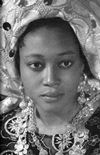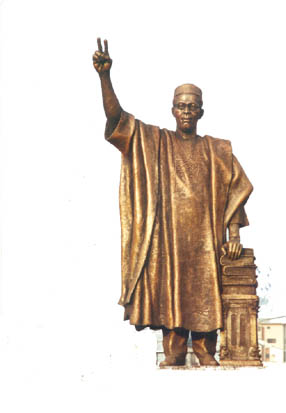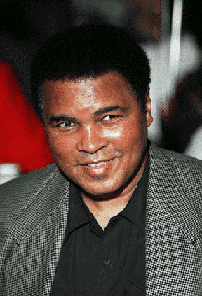|
|
|
|
|
|
 |
LATE CHIEF MOSHOOD KASIMAWO OLAWALE ABIOLA (19 He was a businessman/politician who contested for the Presidential post in the freest and fairest general elections held in 1993. The military government at the time of Gen. Ibrahim Babangida cancelled this election. A year later, when he claimed himself the president of federal republic of Nigeria, he was arrested and jailed by the military president at the time of late Gen. Sanni Abacha. One of his wives Kudirat Abiola was brutally assassinated during while fighting for democracy and her husband's freedom. After the death of the late dictator, Gen. Abacha, Nigerians were hopeful for the release of MKO, but he died of a heart attack on July 7, 1998, when most Nigerians needed him to govern them. I strongly believed that you re the sacrificial lamp Nigerians needed to move forward. Though you re no more and we shall all be remembering you as one of those heroes who fought to see the end of military era in Nigeria. Rest in peace. |
 |
LATE MARTIN LUTHER KING (1929-1968)
How do we talk about African race in America without talking about Late Martin Luther King? How can someone talk about those years of tribulations, discrimination, and segregation without mentioning King's name? Actually, we can not talk of freedom fighters and exclude Martin Luther King's name because of efforts to ensure freedom for the African race in America. Born and grew up in the Southern America where racism had long been the source of social injustice, where black people had suffered discrimination for decades. Martin was a freedom fighter who was inspired by Indian nationalist Mohandas Gandhi, last century's greatest exponent of non-violence, Martin came to the forefront of black struggle for civil rights in 1955, when he acted as the spokesman for the protesters of racism I n Montgomery, Alabama. All his life, he spoke pout against man's inhumanity to man, against the scourge of war and the plague of poverty. He was assassinated in 1968 and people of all political and religious persuasions mourned the passing of the African American preacher, freedom fighter and leader who had helped raise the consciousness of mankind. I strongly salute your tenacity and unbroken focus. Your life sacrificed for the liberation of the African race in America shall remain memorabilia. Rest in peace...! |
 |
LATE CHIEF MRS. KUDIRAT ABIOLA (1952-1996) At 21, she married Late Chief Moshood Abiola in a union that produced seven children. Partly in response to the circumstance of her own history, Alhaja Kudirat (as popularly known) adopted many social causes, and was to become a prime supporter of the educational programs of the Ansar-Ur-Deen movement in Nigeria. Kudirat was also a successful businesswoman, building a pharmaceutical company, amongst many other businesses, into a notable name in Nigeria. Her participation inspired new levels of activism in Nigeria pro-democracy movement. In the summer of 1994, Kudirat was actively involved in moving and sustaining the oil workers twelve-week strike against the military. The strike, which succeeded in isolating and weakening the government, was the longest in African history by oil workers. In December of 1995, when the pro-democracy groups decided to march for freedom in Lagos, Kudirat joined such esteemed nationalists as Chief Anthony Enahoro at the forefront of the march, braving the bullets of government forces sent to intimidate them. On June 4th 1996, a few days to the anniversary of the June 12 commemorative date when Nigerians resolved to vote out the military dictatorship, Kudirat life on earth ended, extinguished by assassins bullets. Alhaja, though you have died, but your spirit lives on and you will never be forgotten as the one who stayed behind her husband till the end. You are indeed a better example to womenfolk. Rest in peace! |
 |
LATE KEN SARO-WIWA (1941-1995) Born at Bori on 10 October, 1941, and he was always proud of his cultural roots. In 1990 Saro-Wiwa founded the Movement for the Survival of the Ogoni People (MOSOP). A more radical youth movement, also founded by Saro-Wiwa, was reputedly engaged in sabotage against Shell. The company decided to cease operations in Ogoniland in 1993. In Nigeria, The Brink of Disaster and Genocide in Nigeria (1992), Saro-Wiwa criticised corruption and condemned Shell and British Petroleum. The Nigerian government decided to break MOSOP and Saro-Wiwa was arrested and a number of his supporters and relatives were slain at Giokoo. In his letter, which was written in prison and published in May 1995 in the Mail and the Guardian, Saro-Wiwa stated: "Ultimately the fault lies at the door of the British government. It is the British government which supplies arms and credit to the military dictators of Nigeria, knowing full well that all such arms will only be used against innocent, unarmed citizens." In another letter he summarised: "The most important thing for me is that I've used my talents as a writer to enable the Ogoni people to confront their tormentors. I was not able to do it as a politician or a businessman. My writing did it. And it sure makes me feel good! I'm mentally prepared for the worst, but hopeful for the best. I think I have the moral victory. The junta later executed saro-Wiwa along with eight other Ogoni leaders and his body was buried in an unmarked, common grave in the eastern city of Port Harcourt. But before he was killed, he said something, hear him:We all stand before history. I am a man of peace, of ideas. Appalled by the denigrating poverty of my people who live on a richly endowed land, distressed by their political marginilization and economic strangulation, angered by the devestation of their land, their ultimate heritage, anxious to preserve their right to life and to a decent living, and determined to usher to this country as a whole a fair and just democratic system which protects everyone and every ethnic group and gives us all a valid claim to human civilization, I have devoted my intellectual and material resources, my very life, to a cause in which I have total belief and from which I cannot be blackmailed or intimidated. I have no doubt at all about the ultimate success of my cause, no matter the trials and tribulations, which I and those who believe with me may encounter on our journey. Nor neither imprisonment nor death can stop our ultimate victory. Though you are no more but one thing is for sure that your legacies shall remain remarkable and evergreen. Rest in peace |
 |
LATE CHIEF OBAFEMI JEREMIAH AWOLOWO (1909-1987) Nigerian statesman, a Yoruba chief, commonly known as Awo. In politics from 1940, he was one of the founders (1943) of the Nigerian Trades Union Congress. In 1950 he founded the Action Group, a new political party. Elected (1959) to Nigeria's house of representatives, he became leader of the opposition. Sentenced to 10 years for his party's attempted coup (1962), he was released in 1966. He was a leader against the Biafran secession and was federal Finance Minister until 1971. After military rule, he founded the United Party of Nigeria and placed second in the presidential elections of 1979 and 1982. |
 |
CHIEF NELSON MANDELA (The father of freedom) Nelson Rolihlahla Mandela was born in a village near Umtata in the Transkei on the 18 July 1918. His father was the principal councillor to the Acting Paramount Chief of Thembuland. After his father s death, the young Rolihlahla became the Paramount Chief s ward to be groomed to assume high office. However, influenced by the cases that came before the Chief s court, he determined to become a lawyer. Hearing the elders stories of his ancestors valour during the wars of resistance in defence of their fatherland, he dreamed also of making his own contribution to the freedom struggle of his people. After his primary and secondary education he enrolled at the University College of Fort Hare for the Bachelor of Arts Degree. He was suspended from college for joining in a protest boycott. He went to Johannesburg where he completed his BA by correspondence took articles of clerkship and commenced study for his LLB. He entered politics in earnest while studying in Johannesburg by joining the African National Congress in 1942. Mandela prefaced this challenge with the affirmation: I detest racialism, because I regard it as a barbaric thing, whether it comes from a black man or a white man. He was convicted and sentenced to five years imprisonment. While serving his sentence he was charged, in the Rivonia Trial, with sabotage. His statements in court during these trials are classics in the history of the resistance to apartheid, and they have been an inspiration to all who have opposed it. Here him: I have fought against white domination, and I have fought against black domination. I have cherished the ideal of a democratic and free society in which all persons live together in harmony and with equal opportunities. It is an ideal which I hope to live for and to achieve. But if needs be, it is an ideal for which I am prepared to die.Released on 11 February 1990, Mandela plunged wholeheartedly into his life's work, striving to attain the goals he and others had set out almost four decades earlier. In 1991, at the first national conference of the ANC held inside South Africa after being banned for decades, Nelson Mandela was elected President of the ANC while his lifelong friend and colleague, Oliver Tambo, became the organisation's National Chairperson. Nelson Mandela has never wavered in his devotion to democracy, equality and learning. Despite terrible provocation, he has never answered racism with racism. His life has been an inspiration, in South Africa and throughout the world, to all who are oppressed and deprived, to all who are opposed to oppression and deprivation. In a life that symbolises the triumph of the human spirit over man s inhumanity to man, He accepted the Nobel Peace Prize in 1993 on behalf of all South Africans who suffered and sacrificed so much to bring peace to our land. |
 |
MOHAMMED ALI Muhammad Ali is one of the most remarkable personalities of our time and the greatest sportsman ever to walk the earth. Was it his physical prowess, his social commentary, his clever, cocky rhymes? Or was it his post boxing, humanitarian endeavours? Maybe it's all of the above for many who have been inspired, uplifted, and touched by the greatest champion of all time, Muhammad Ali. Muhammad Ali has undoubtedly been a fixture in world culture since the 1960's. Seizing the gold medal at the Olympics in 1960, battling George Foreman in "The Rumble in the Jungle" in Zaire, and going head to head with Joe Frazier in "The Thrilla in Manila" in the Philippines, were highlights of a career that earned Ali the status of world icon. Since his retirement in 1981, Ali has engaged in many humanitarian endeavours, including a 1990 journey to Iraq to negotiate the release of 15 hostages. In the last 20 years, Ali's cultural status has hardly diminished: 3 billion television viewers around the world watched him open the Atlanta Olympics in 1996. Inspiring billions has been an arduous work in progress for Ali. Many Americans were slighted by his brazen "I am the greatest" anthem. White America couldn't fathom a black man being so presumptuous. These same Americans were also enraged by Cassius Clay's insistence on relinquishing what he called his "slave name" for the Muslim name, Muhammad Ali. "I don't have to be what you want me to be; I'm free to be what I want," Ali said of his name change. The relationship did not improve much when Ali spoke out against Vietnam, refusing to join the Army during the war. His short defence "I ain't got no quarrel with them Viet Cong" spoke volumes, but the media vilified him. The government prosecuted him for draft dodging, and the boxing commission took away his license. He was idle for three and a half years during what should have been the peak of his career. Ali's return to boxing was a spectacular one. He regained his title in 1974, knocking out tough guy George Foreman in the eighth round in the famed "Rumble in the Jungle." This widely publicised fight became a permanent chapter in boxing history. Ali wrote of this fight: "'The Rumble in the Jungle' was a fight that made the whole country more conscious. I wanted to establish a relationship between American blacks and Africans. All the time I was there, I'd travel to the jungles, places where there was no radio or television, and people would come up and touch me, and I could touch them. The fight was about racial problems, Vietnam. All of that." |